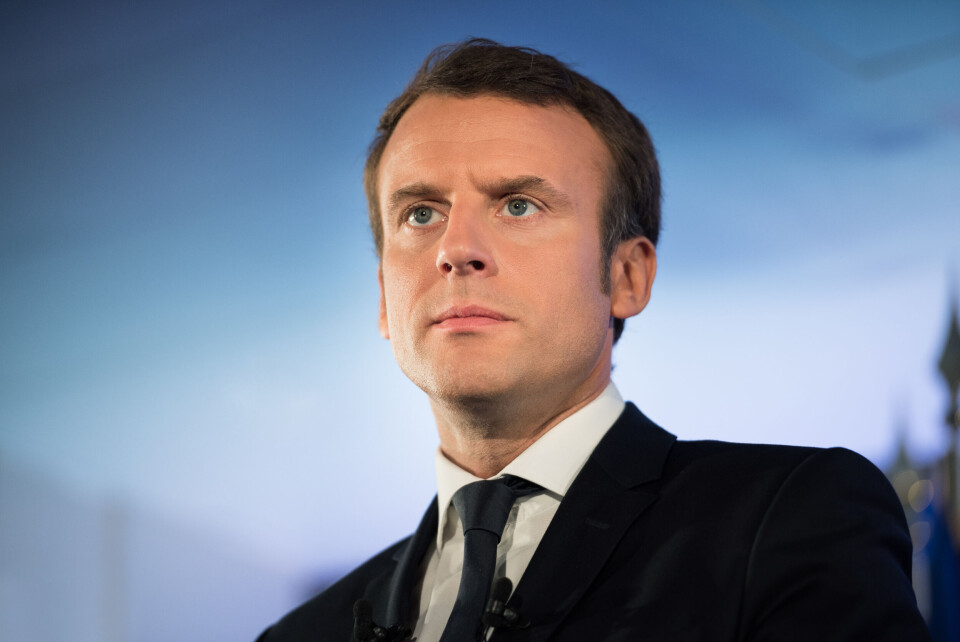-
Trump calls for Marine Le Pen to be freed (but she is not in prison)
US president said her embezzlement court case was a ‘witch hunt’
-
'Our French neighbours never invite us over to their house'
Columnist Cynthia Spillman offers some advice on returning hospitality
-
Marine Le Pen appeal decision should be given in summer 2026, says court
It comes as the RN leader continues to maintain her ‘innocence’ and right-wing politicians have called her conviction ‘an attack on democracy’
‘Is French President Macron right or left-wing? It depends’
Columnist Richard Ogier explores Macron’s career, policies and behaviours to conclude perspective is everything in politics

Something opaque has crept into Emmanuel Macron’s politics.
His party losing its outright majority in the June parliamentary elections has left a question mark hanging over his policy priorities.
And yet there’s broad consensus among the French political and media establishment that the President’s true political stripe is the blue of the French political right. But is it?
We all see things from our own perspective
Donald Trump’s ‘alternative facts’ lacerated the romance of the old argument about objectivity being in the eyes of the beholder, whimsically captured by the francophile British novelist, Jeanette Winterson.
“Everyone who tells a story tells it differently, just to remind us that everybody sees it differently,” she wrote in the ‘Frenchest’ of her early novels, the exquisite, The Passion.
But there’s obviously a collective cultural element in how we interpret the “cat’s cradle complexity of things”, as Winterson described it, perhaps especially when the sphere is the wild and knotty cord of contemporary politics.
Cost of living support is not right-wing
By the cast of key current policy, it’s surely hard to think of Macron as on the right, at least for this Australian, or dare I say, for many francophile Anglo-American or other foreigners.
Read more: MPs pass France’s purchasing power law: What does it include?
The government’s so-called “energy price shield” has capped regulated energy price increases at 4% and frozen the cost of domestic gas.
The measures, though to be curtailed in 2023, have helped families meet their energy bills while limiting inflation relative to comparable countries, like Britain and Germany.
Is it a good policy? There’s the downside of the astronomical cost adding to the dead weight of French debt.
But it is patently market-distorting, so could hardly be called right-wing.
Macron’s social justice arguments and tax on tech giants
Pension reform is back on the agenda. Macron has previously argued its necessity on social justice grounds.
Read more: Should people in France work more to pay for ‘unique’ social model?
The objective is to raise the retirement age to 64 or 65, with provisions to protect the vulnerable.
Given that French life expectancy has grown to 83 years, up from 66 in 1950, it’s hard not to think of it as necessary, non-ideological reform.
And there are multiple additional examples: a tax on tech giants; incentives for corporate profit-sharing; a substantial eurozone budget, none of which, other than for the radical left, would qualify as right-wing.
Macron’s earlier political career was on the left
In strict party-political terms, Macron is of the left. He was a Finance Minister under Socialist President François Hollande.
His political philosophical roots are social-democratic, substantially in the person of Michel Rocard.
Former PM Rocard remained a second-tier figure in French socialism due to wily President François Mitterrand, who for a period tied the Parti socialiste to the French Communist Party.
Rocard, who wanted all of employment, productivity and labour protection, was asphyxiated by the old party-political left.
As was Macron, by the combative rebel frondeurs, which is why he broke away to form his own party.
The PS remained substantially unreformed until it imploded in June, subjugating itself to hard-left Jean-Luc Mélenchon’s ‘Nupes’.
The kind of left party reform seen in Britain with Tony Blair (the Third Way), the Hawke-Keating years in Australia, the modernising figure of Bill Clinton in the US, Gerhard Schröder and the so-called Hartz reforms in Germany, has never been seen in France.
Read more: New advisor to President Macron worked for Blair and Murdochs
Why the imperative to paint Macron blue?
Well, he modestly reformed the tax burden in a bid to energise the economy.
But a deeper reason is because red was always the fashionable colour in French political circles.
After the war, it was the blood red of the existentialist left.
Structuralism was added to Marxism, both of which Macron rejects, after the faux revolution of May 1968, about which he has expressed major reservations.
Macron does not fit left or right
In the broad terms of my own theorising, Macron doesn’t fit categories in a political culture fond of the binary left/right.
Born and raised in provincial Amiens yet Parisian by adoption, Macron is disruptively of the left but economically and socially liberal (witness his reconstituted family).
He’s an English speaker fascinated by Germany, tech-savvy but with decidedly traditional cultural tastes. And on it goes.
Communicative, approachable, tactile even, but with a troubling proclivity for top-down decision-making.
But why bother? Why concern ourselves with the colour of Macron’s political make-up?
As ever, in a bid to better understand France in all its complexity. And its difference, real and imagined.
So there’s an argument for saying that the moderate left in France, which for some French is the right, is embodied in the person of the current French president.
Yet, and thankfully, it rather depends on your perspective.
Related articles
‘Genuine reverence for the Queen from Macron the modern French king’
Healthcare, climate, cigarettes: France announces its 2023 budget
‘UK and France must work together now more than ever’
























